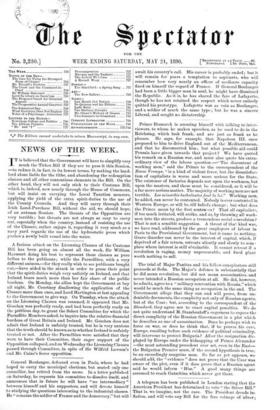The trial of Major Panitza and his fellow-conspirators still proceeds
at Sofia. The Major's defence is substantially that he did mean revolution, but did not mean assassination, and never intended a Russian occupation at all. He did, however, he admits, agree to a "military convention with Russia," which would be much the same thing as occupation in the end. The Government allege that they can and will prove, from un- deniable documents, the complicity not only of Russian agents, but of the Czar; but, according to the correspondent of the Standard, they agree not to exact capital penalties. We do not quite understand M. Stambouloff's eagerness to expose the direct complicity of the Russian Government in a plot which he describes as one of assassination. Does he perhaps wish to force on war, or does he think that, if he proves his case, Europe, recoiling before such evidence of political criminality, will intervene to protect Bulgaria? After the resignation dis- played by Europe under the kidnapping of Prince Alexander —the most astounding precedent ever set, even in the East— the Bulgarian Premier must, if the second hypothesis is true, be an exceedingly sanguine man. So far as yet appears, we should add, the " evidence " does not prove that the Czar was aware of the plot, even if it does prove that a Russian agent said he would inform "Him." A good many things are assumed to reach Gatschina which never get there.


































